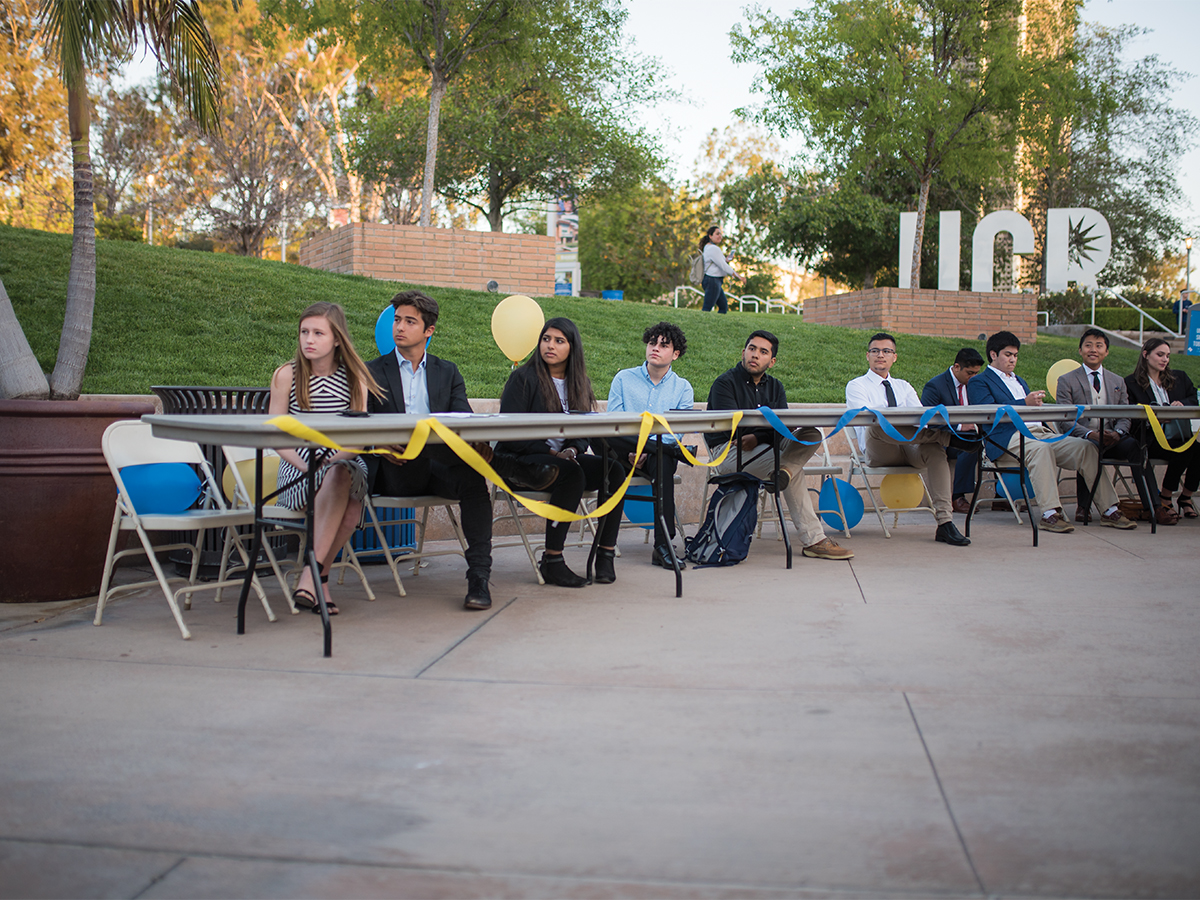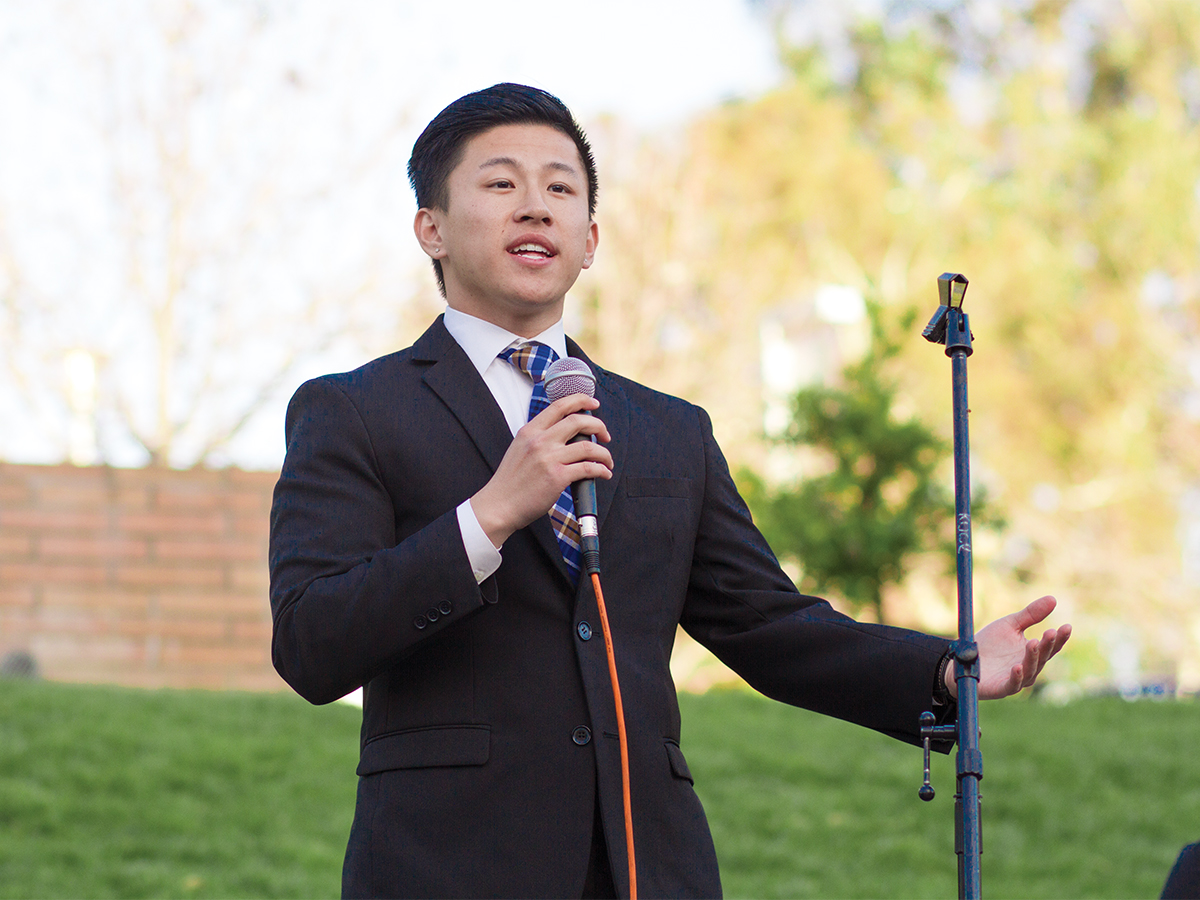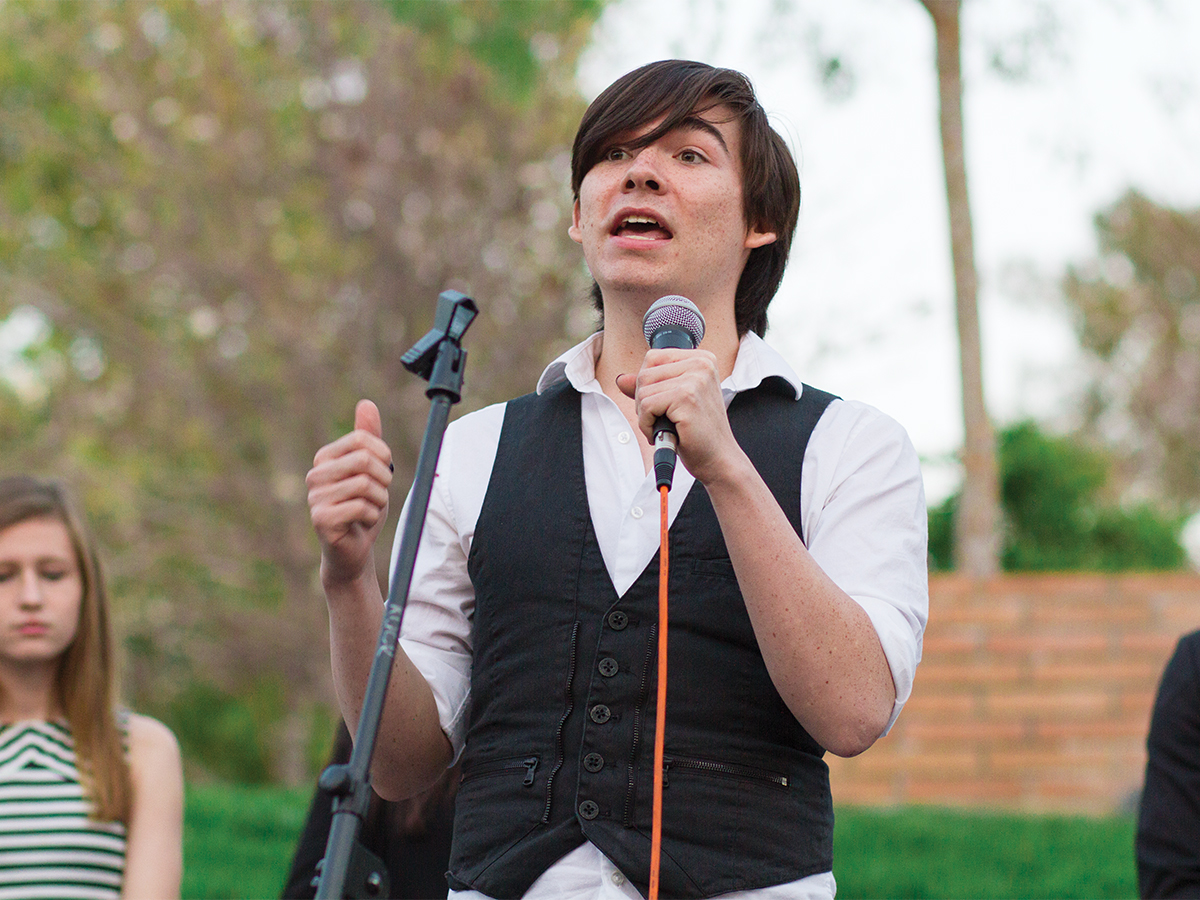
By: Vivian Lee, SSW and Mark Bertumen, CW
This year’s annual ASUCR debates featured candidates for a variety of positions, speaking about their future plans and initiatives while addressing on-campus issues for the 2018-2019 academic year. The debates were introduced by ASUCR Elections Director Taylor Brown, and moderated by Highlander News Editor Evan Ismail.
PRESIDENTS
Debates began with presidential candidates Semi Cole and Diana Jekki responding to questions pertinent to campus and student concerns. One of the leading questions posed to the candidates inquired about their future plans if elected to office. Cole shared that he wants to “restore the voice of students and their faith in (ASUCR) leadership” while combating what he perceives as general student apathy for student council. He also promised to increase student awareness for programs within Costo Hall. Jekki touted her past experience lobbying to prioritize students’ academic endeavors as well as their overall well-being. She emphasized the need to vote for the referenda and pass the required 20 percent voter turnout threshold.
Each candidate expressed different approaches to the presidency, touching on issues such as food and housing insecurity. Addressing concerns about recent nationwide instances of police brutality, Cole introduced his idea to create a University of California Police Department task force to keep the department accountable. Cole encouraged students to meet with him following the debate and said, if elected, he would be available for students to share their opinions about ASUCR during his office hours. Jekki followed by discussing her plans to increase transparency and reduce divisive topics such as the R’Gear controversy. In addition, Jekki mentioned her goal to forge better relationships with Costo Hall programs and other organizations.
EXECUTIVE VICE PRESIDENT
Following the presidential debate were Executive Vice President candidates Johnathan Li

and Andrea Cuevas, who answered questions centered around their past experience working for ASUCR. Li elaborated on his experience currently working as vice president of external affairs in 2017-18, which segued into a discussion of his plans to further develop his current projects such as the clicker rental program and establishing an agreement with Stater Bros. to help provide funding and donations toward a self-sufficient R’Pantry. Cuevas followed by explaining her initial role in ASUCR as a senate intern, and then vice chair of personnel in 2017-18. These roles allowed her to “bring a fresh perspective to ASUCR” and create “structure to the senatorial and (first-year) fellowship program,” according to Cuevas. Both candidates emphasized the need for senator accountability and encouraged a stronger relationship with Costo Hall and their minority programs by reminding their constituents of the referendum’s role in these programs’ future.
EXECUTIVE CABINET
Vice President of Internal Affairs: Jose Cortez-Hernandez followed, running unopposed for vice president of internal affairs. After noting his involvement with ASUCR as CHASS senator in 2016-17 and vice president of finance in 2017-18, Cortez-Hernandez proposed that there be structural changes to the Association. He wishes to create a referendum that provides permanent funding to R’Pantry for its staff which, according to his connections in R’Pantry, has a bigger problem than gathering food for students. He also seeks to put the Diversity Council in charge of planning the Beyond R’Margins Conference.
Outreach Director: After Cortez-Hernandez, one of the two candidates for outreach director was next up on the stage: current CHASS Senator Carolyn Chang. Isaiah Kim, the other candidate, was absent from the event. Chang introduced herself by outlining her time at ASUCR, first as a freshman finance fellow, and as a CHASS senator. Chang said that, if elected, she intends to visit at least two high schools a quarter to educate younger students about college and how to prepare for it.
When asked about how more money would be raised for student organizations, Chang responded that the organizations currently get a sufficient amount of money from the students’ quarterly ASUCR fee. But, if elected, she plans to alter the system of clubs signing up for funds to increase the amount of clubs eligible for funding. “Instead of having nine clubs and three auto-renewals sign up, there will be more positions for clubs to sign up for the money, so more clubs will have an equal chance for funding,” Chang said.
Personnel Director: Jordan Steinhauser and Nataly Morales, came to the front. Steinhauser aims to get UCR students more involved on campus, wishing to improve turnout at events, such as the one she was currently speaking at, and to allow more volunteers to be accepted for campus activities on the basis of personal merit, not connections.
Morales remarked that publicity in the social media field has been “lacking” for both ASUCR and committee events and intends to improve on it by posting committee the minutes and monthly reports activity on the ASUCR website.
Transfer and Non-traditional director: If elected as director, Vanessa Salinas said she wishes to hold more events that cater to both transfer and non-traditional students. This is meant to counter the uneasiness that those students face entering a new academic environment, to let them socialize more and become more involved on campus. Salinas also intends to increase the overall publicity of the committee her position overlooks, noting that the position opened up only two years ago and is currently “working to make a name for itself.”
CHASS SENATORS:
Julian Gonzales, a second-year political science major, aims to increase diversity, make UCR more affordable to attend and “create a campus that everyone is proud of.”
Brandon Lieu, a third-year business administration major, outlined his appointments to various committees and the Academic Senate. As senator, Lieu aims to improve student aid wait times, promote student success with mental health programs for students and improve on the “bad light” UCR has with the community and the Inland Empire.
Kiley Atwood spoke how she wanted to increase leadership, especially among CHASS students. “I want to find new ways … to find leadership opportunities and open them up to avenues like ASUCR.” She cites her leadership experience on women’s cross country and track team as merit for her campaign to be a CHASS senator.
Mehvish Ali, a second-year business administration major, opened by saying “Ubuntu (I am because we are),” a phrase she learned from a leadership conference in her first year at UCR. As senator, she aims to provide occupational skills to students early on in their academic career, as well as improve UCR’s relationship with the surrounding community. She also wants to let the school’s prestige be recognized, referring to UCR’s medical school which is the first medical school built on the west coast in the last 50 years.
Justin Domecillo, a third-year transfer student and campus organizing director for the

Office of External Affairs, emphasized his understanding of student issues. “I am not a very traditional student, and I don’t have a lot of traditional ideas … I’m running because I have ideas that empower students.” If elected, Domecillo aims to add another seat to the finance committee, specifically for an undocumented student, and to allow a bylaw allows students in the audience to interrupt Senate meetings if something untoward is said by a delegate.
Juan Riley, a second-year economics major, stated that as a student athlete, he and other student athletes were not strongly connected to the student body, and wants to work to strengthen that connection, such as by increasing student turnout to games. He also wants to work with R’Pantry to improve food security on campus.
Jonathan Escobar, a first-year political science major, intends to get students more involved in the decisions that affect them, such as the policies enacted by ASUCR and committees, and to give them a voice for those student organizations to listen to. Escobar refers to UCR as a “majority of minorities,” and remarked that they are not to be neglected.
Luis Huerta, a first-year student majoring in political science, stated that there was a disconnect between ASUCR and the Costo Hall that he wanted to eliminate in part by allocating more funds to Costo Hall. He also plans to work on the clicker rental program, and ensure that there is an ample supply for students in the future.
Avi Idea, a first-year business student, outlined the three platforms he stood on as a candidate: Improving accountability in ASUCR and making it easier for students to get involved with the governing body; improving food security at UCR, citing the 62.5 percent statistic of food-insecure students on-campus as reason, by collaborating with R’Pantry and CalFresh; and addressing security and safety on campus by increasing the number of lamps on campus, additionally referring to the recent slew of “lewd acts” that have been occuring on campus.
Tony Xu, a transfer, commuter and international student, moved down to California to start a business, but had to go back to school. Xu intends to improve the quality of academic advising at UCR.
Lennin Kuri, a first-year political science student, introduced himself as the government relations assistant director under the vice president of external affairs. As senator, he wants to “make sure marginalized voices are heard within our diverse campus, make sure their voices are uplifted and represented.”
Alyssa Tocker, a third-year sustainability studies and theatre, film and digital production double major, currently serves as the programming director for GCAP. Her main platform is to ensure that all students are represented fairly by holding her office hours in the HUB. She also wants to address food insecurity, as well as accessibility to classes.
Chelsea Davenport, a classics major and non-traditional student, returned to school after years of having to work. During her speech, she touched upon the communities that are not included in the decision process of governing bodies, and aims to work toward making those voices become heard. She also wants to end the stigmas associated with using organizations like the R’Pantry.
BCOE SENATORS
Sarah Al-Khalili, first-year bioengineering major, focused on the cost of access codes for students’ homework, stating that she wants to circumvent those fees. “Students in all colleges have to deal with this, and I believe that students shouldn’t have to pay just to do their homework.” Al-Khalili also noted that she is running due to the lack of women in BCOE. “I want to be a voice for them, since we are basically the minority in that college.” She also wants to represent the Muslim community at UCR, since she found that the group was not especially represented at many campus events.
Joel Sanchez, a first-year mechanical engineering student said that he plans to address the academic development of freshman and transfer students in BCOE. For both, he specifically wants to deal with issues that arise around textbook codes and school supplies. Sanchez also focused on professional development in his speech, wanting to work with the Society of Hispanic Engineers and the Society of Women Engineers “to look toward minority students in engineering and seeing how they can improve upon themselves and grow into the engineers of the future.”
Voting begins on Monday, April 23, and ends on Friday, April 27. There will be polling booths near Aberdeen-Inverness (AI), Bear’s Den, the Student Recreation Center and the Rivera Library. Students must have a UCR card to vote or a valid ID and proof of your registration to the UCR campus.
Voting can be done between the hours of 10 a.m. to 3 p.m. and 5 p.m. to 7 p.m. Incentives will be given to the earliest voters of each day. The first 500 voters on Monday will receive a Carl’s Jr. meal, the first 300 voters on Tuesday will receive a taco plate, the first 150 Wednesday voters will get a Jamba Juice beverage, all Thursday voters get a color-changing cup and the first 100 Friday voters get a donut.








